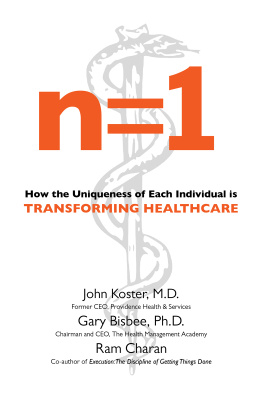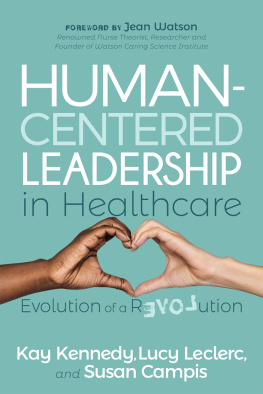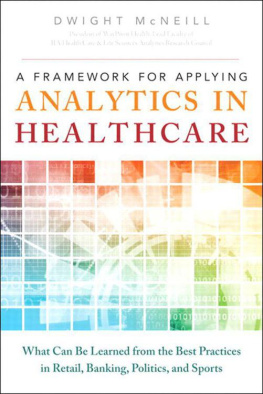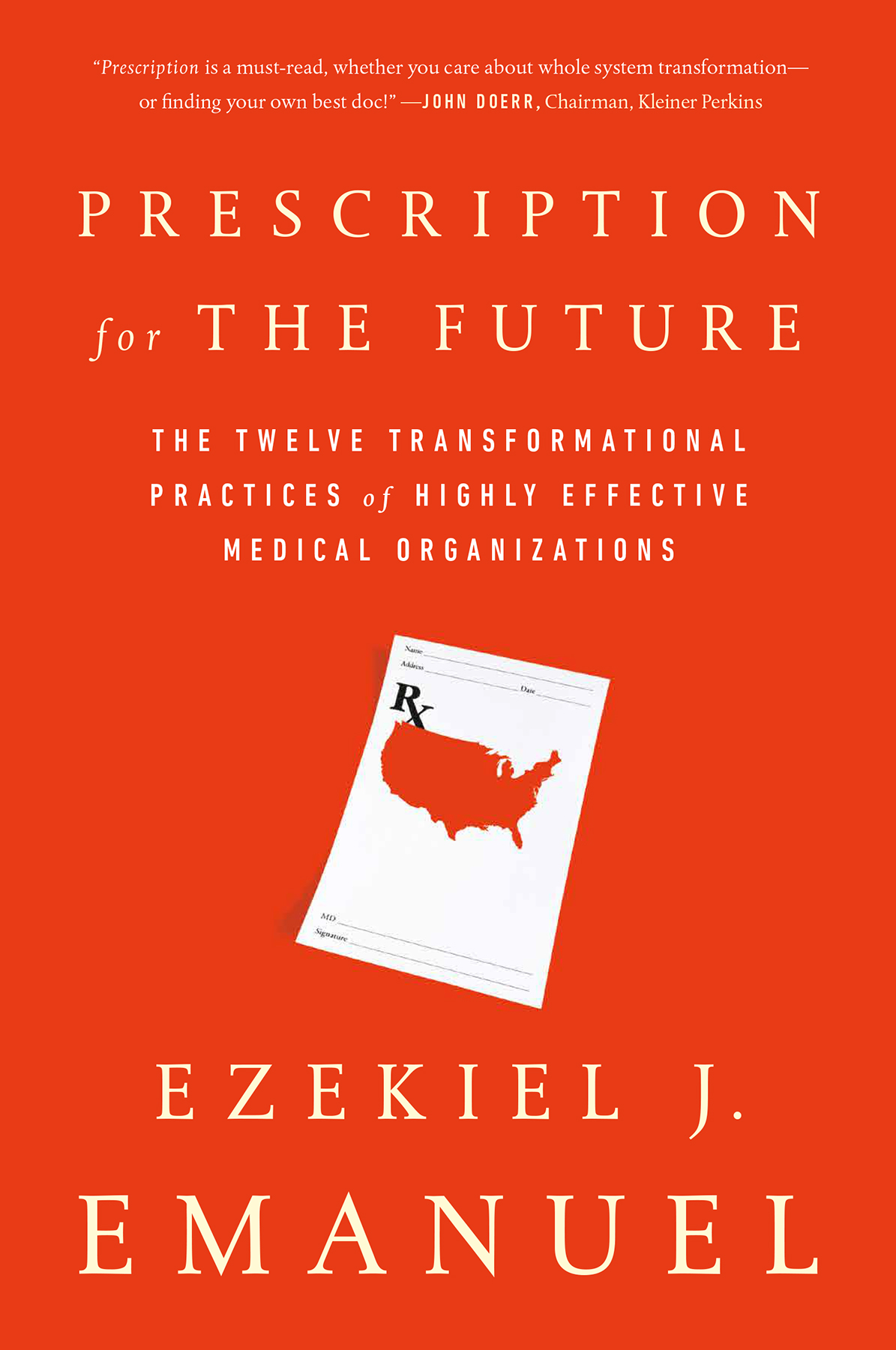Copyright 2017, 2018 by Ezekiel J. Emanuel
Hachette Book Group supports the right to free expression and the value of copyright. The purpose of copyright is to encourage writers and artists to produce the creative works that enrich our culture.
The scanning, uploading, and distribution of this book without permission is a theft of the authors intellectual property. If you would like permission to use material from the book (other than for review purposes), please contact permissions@hbgusa.com. Thank you for your support of the authors rights.
PublicAffairs
Hachette Book Group
1290 Avenue of the Americas, New York, NY 10104
www.publicaffairsbooks.com
@Public_Affairs
Originally published in hardcover and ebook by PublicAffairs in June 2017
First Trade Paperback Edition: September 2018
Published by PublicAffairs, an imprint of Perseus Books, LLC, a subsidiary of Hachette Book Group, Inc. The PublicAffairs name and logo is a trademark of the Hachette Book Group.
The Hachette Speakers Bureau provides a wide range of authors for speaking events. To find out more, go to www.hachettespeakersbureau.com or call (866) 376-6591.
The publisher is not responsible for websites (or their content) that are not owned by the publisher.
Editorial production by Christine Marra, Marrathon Production Services. www.marrathoneditorial.net
Library of Congress Cataloging-in-Publication Data is available for this book
ISBNs: 978-1-61039-725-4 (hardcover); 978-1-61039-726-1 (ebook);
978-1-5417-2414-3 (paperback)
E3-20180802-JV-PC
The healthcare system is dynamic. In part, this is because of the election of a new administration, its commitment to repealing and replacing the Affordable Care Act without much specific detail, and the consequent uncertainty about what policies will ultimately come out of Washington. This dynamism is partially the result of the ongoing changes currently occurring throughout the healthcare system. Nevertheless, we have reached and exceeded the tipping point of care delivery transformation. Although the direction of change is now clear, the pace at which it will occur in different localesand whether there might be some temporary setback along the courseremains unclear. For now, all the information is accurate up until the words were set in the book during the spring of 2017.
This book contains many stories. All the patients names have been changed to protect their privacy. A few physicians namessuch as my primary care physicians namehave been changed, again, to protect their privacy. The names of the physician leaders and executives at the various practices, multispecialty groups, and health systems that I visited as part of my research and case development are real.
Finally, I have several conflicts of interest to disclose. I teach at the University of Pennsylvania and describe some of the innovations at my home institution. Over the years I have given scores of speeches for fees, including at some of the organizations profiled in the book: Kaiser Permanente, Anthem (owner of CareMore), and Advocate Health Care. More importantly, I mention the work of several private, for-profit companies innovating and transforming the system. I work for a venture capital firm, Oak HC/FT, which has investments in 3 of the companies profiled: Aspire, Quartet, and VillageMD: I also sit on the boartd of VillageMD. Oak HC/FT and I have no financial relationship with nor have I received speaking fees or other compensation from other companies and medical organizations profiled in this book, including Aledade, Certify, ChenMed, Dean Clinic, Iora Health, WESTMED, Main Line Oncology, and Hoag Orthopedic Institute.
TO TRUE FRIENDS WHO HAVE ALWAYS GUIDED ME WISELY
Gregory C. Keating
Corby Kummer
Andrew T. Oram
Henry S. Richardson
Donald Rosenstein
A LTHOUGH THEY FAILED TO repeal the Affordable Care Act in toto, President Trump and the Republican Congress did repeal the individual mandate, eliminate the cost-sharing subsidies that helped lower-income Americans, reduce the open-enrollment period, and cut funding for its advertisement and assistance in navigating the health insurance marketplaces. The landscape looks very different in 2018 than it did before the 2016 election. With so many setbacks, its fair to ask: Is a book advocating reform and transformation of the American healthcare system irrelevant?
The short answer is: No. In fact, the ideas that form the core of this bookideas aimed at showing how to develop an innovative, value-driven healthcare delivery system in the United Statesare probably more relevant today than ever.
To many people, that answer may seem counterintuitive. While a burst of healthcare reform zeal fueled the 2008 election and the passage of Affordable Care Act (ACA) in 2010, the Republican sweep in 2016combined with the subsequent legislative and regulatory reversals of central portions of the ACAlook like a repudiation of government-propelled, indeed, any, healthcare reform. But the response to these repeal efforts has not been what most Republicans predicted. Debate about repealing the individual mandate boosted support for the Affordable Care Act. Slashing the open enrollment period for the exchanges in half and reducing advertising for the exchanges by 90% hardly affected enrollments. Indeed, the back and forth since the 2016 election contains three important messages. First, the majority of Americans do think everyone is entitled to health coverage and that the government has an indispensable role in guaranteeing it. It is no longer acceptable that hardworking Americans lack health insurance. Second, while the ACA may not be the best way to cover everyone, Americans will not give up on it without some concrete alternative. They do not want a repeal without a coherent replacement that addresses the key problems of the system such as preexisting conditions. Third, and most importantly, Americans feel the system is still not working as it should. It is becoming increasingly clear that the American healthcare system is plagued by two fundamental problems: it underperforms on almost every metric and it is increasingly unaffordable. Improving the American healthcare system is something every patient, every corporate executive, every physician, nurse, and practitioner, every politician and policymaker cares or should care about. Beyond debates about the various provisions of the ACA, the exchanges, and subsidies, all Americans realize the overall system still needs more fixing.
No matter how you measure it, the American healthcare system continues to malfunction. Tens of millions of people are still uninsured. Health expenditures remain astronomically highnearly $10,000 per American and 20% higher per capita than the next highest spending country, Switzerland. Despite these exorbitant expenditures, health outcomes in the United States are not 20%, 10%, or even 5% better than in other developed countries. While we may match the rest of the world in a few health outcomes, such as cancer survival, trauma, and organ transplantationand even these are contentiously debatedwe lag behind in most other areas. On even the most basic measures of health system qualitylife expectancy, maternal, infant and youth mortality, immunization rates, asthma survival, heart attack survival, control of diabetes, and mental healththe United States falls well below other developed countries. There are also endless complaints about impersonal care, hospital-acquired infections, rushed office visits, excessive admissions to the ICU, and too many high-tech interventions at the end of life. Such inconsistent and relatively poor performance at such a high cost should infuriate any responsible corporate executive. It rightfully infuriates the American public.







